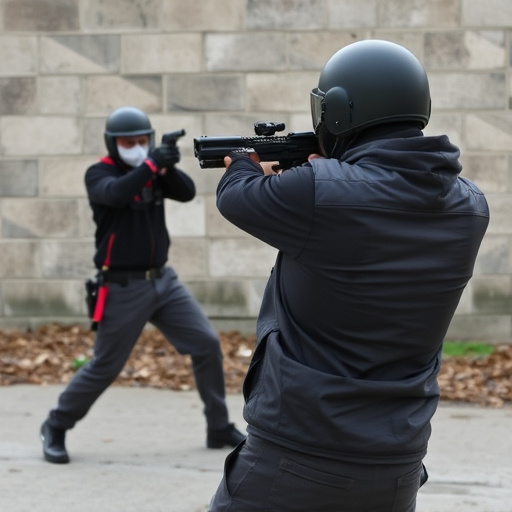Understanding local laws is crucial for legal pepper spray carriage (How to Legally Carry Pepper Spray). Regulations differ by region, dictating age restrictions, permit needs, and permitted areas. Differentiate police-grade from commercial-grade sprays based on capsaicin content and intended use. Store pepper spray securely in authorized containers, be mindful of surroundings, and only deploy for self-defense or others' protection.
Pepper spray, a powerful personal defense tool, has become increasingly common for self-protection. But navigating the legalities of carrying it can be complex. This guide delves into the world of police-grade inflammatory pepper spray compounds, offering insights on choosing the right grade and understanding local laws. Learn essential tips for safe and responsible carriage, ensuring you stay within legal boundaries. Discover how to make informed decisions, from selecting the appropriate spray to mastering best practices for personal safety.
- Understanding Pepper Spray Legality: Local Laws and Regulations
- Choosing the Right Grade for Your Needs: Police vs. Commercial
- Carrying Pepper Spray Safely and Responsibly: Tips and Best Practices
Understanding Pepper Spray Legality: Local Laws and Regulations
The legality of carrying pepper spray varies significantly from one location to another, with local laws and regulations dictating its use, possession, and transportation. Before considering how to legally carry pepper spray, it’s crucial to understand these nuances. Each jurisdiction sets its own guidelines, focusing on issues such as age restrictions, permit requirements, and areas where the spray is permitted (e.g., in vehicles or public spaces).
To legally carry pepper spray, individuals must navigate these local laws meticulously. This involves researching specific regulations for their region, obtaining any necessary permits, and adhering strictly to labeling instructions. Understanding these legal constraints ensures responsible usage and avoids potential penalties. For those who reside in areas where pepper spray is regulated, knowing how to legally acquire and carry it can be a vital tool for personal safety while staying within the confines of the law.
Choosing the Right Grade for Your Needs: Police vs. Commercial
When considering how to legally carry pepper spray, understanding the difference between police-grade and commercial-grade compounds is essential. Police-grade pepper spray is specifically designed for law enforcement use and meets stringent criteria for potency, safety, and effectiveness. These formulations often contain higher concentrations of capsaicin, the active ingredient responsible for the burning sensation, ensuring it can incapacitate subjects quickly in high-pressure situations.
Commercially available pepper spray, while still potent, may vary significantly in quality and strength. It’s tailored to meet consumer needs rather than enforcement requirements. For individuals seeking self-defense options, understanding these distinctions is crucial. If your primary concern is personal safety, commercial-grade sprays can be adequate, but for those looking to legally carry a device for professional or security purposes, opting for police-grade pepper spray ensures compliance with legal standards and optimal performance when it matters most.
Carrying Pepper Spray Safely and Responsibly: Tips and Best Practices
Carrying pepper spray responsibly involves understanding local laws and regulations regarding its use and possession. Before legally carrying pepper spray, familiarize yourself with your region’s rules—these can vary greatly depending on where you live. Some areas may permit it only for specific purposes, such as self-defense in certain situations, while others might have strict limitations on who can possess and carry it.
To ensure safety, always store pepper spray securely, keeping it out of reach of children and unauthorized individuals. Use durable holsters or bags designed specifically for carrying pepper spray, and consider factors like ease of access and reliability. Avoid leaving it in your vehicle unless secured, as temperatures inside cars can fluctuate dangerously. When carrying pepper spray, be aware of your surroundings; stay calm, and only deploy it when necessary to protect yourself or others from imminent harm.
When it comes to pepper spray, understanding its legality, choosing the right grade for your specific needs, and learning how to safely carry it are essential steps. By adhering to local regulations and implementing best practices, you can ensure that you’re using this powerful tool responsibly. Remember, proper knowledge and safe handling of pepper spray are crucial not only for personal protection but also for avoiding legal repercussions. Always stay informed about your rights and obligations when it comes to carrying pepper spray legally.
